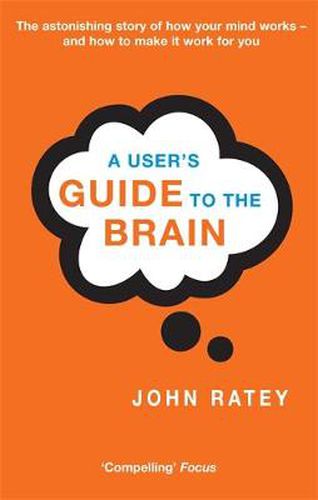Readings Newsletter
Become a Readings Member to make your shopping experience even easier.
Sign in or sign up for free!
You’re not far away from qualifying for FREE standard shipping within Australia
You’ve qualified for FREE standard shipping within Australia
The cart is loading…






Bringing order and relevance to the cascade of recent brain findings, Dr John Ratey explains the brain’s most important systems, the role they play in determining how we interact with the world and ways in which we can influence their operations for the better. Throughout, he illustrates his points with vivid and often surprising examples drawn from his own practice, research and everyday life. Ratey answers such compelling questions as: What does it mean to be linguistically ambidextrous How does a mother’s cradling of her child on her left shoulder relate to the development of language skills
Why does listening to music while doing homework improve accuracy
Why do people like spicy foods He also analyses the ways in which things can go wrong, detailing causes and treatments for diseases such as autism, Parkinson’s and Alzheimer’s, as well as numerous neurological disorders. As Dr. Ratey demonstrates throughout the book, the brain is astonishingly flexible, able to be retrained and reprogrammed. Like a muscle, it responds to use, adapting to new demands and conditions, allowing, as the title of the book suggests, the guidance of the user.
$9.00 standard shipping within Australia
FREE standard shipping within Australia for orders over $100.00
Express & International shipping calculated at checkout
Bringing order and relevance to the cascade of recent brain findings, Dr John Ratey explains the brain’s most important systems, the role they play in determining how we interact with the world and ways in which we can influence their operations for the better. Throughout, he illustrates his points with vivid and often surprising examples drawn from his own practice, research and everyday life. Ratey answers such compelling questions as: What does it mean to be linguistically ambidextrous How does a mother’s cradling of her child on her left shoulder relate to the development of language skills
Why does listening to music while doing homework improve accuracy
Why do people like spicy foods He also analyses the ways in which things can go wrong, detailing causes and treatments for diseases such as autism, Parkinson’s and Alzheimer’s, as well as numerous neurological disorders. As Dr. Ratey demonstrates throughout the book, the brain is astonishingly flexible, able to be retrained and reprogrammed. Like a muscle, it responds to use, adapting to new demands and conditions, allowing, as the title of the book suggests, the guidance of the user.